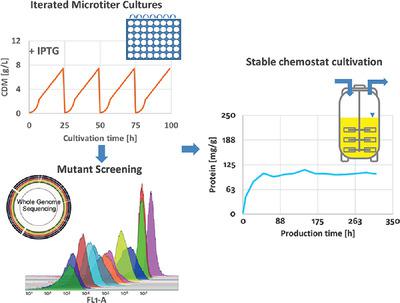当前位置:
X-MOL 学术
›
Biotechnol. J.
›
论文详情
Our official English website, www.x-mol.net, welcomes your feedback! (Note: you will need to create a separate account there.)
Adaptive Evolution in Producing Microtiter Cultivations Generates Genetically Stable Escherichia coli Production Hosts for Continuous Bioprocessing
Biotechnology Journal ( IF 4.7 ) Pub Date : 2020-10-20 , DOI: 10.1002/biot.202000376 Artur Schuller 1 , Monika Cserjan‐Puschmann 1 , Christoph Köppl 1 , Reingard Grabherr 1 , Martin Wagenknecht 2 , Matteo Schiavinato 3 , Juliane C. Dohm 3 , Heinz Himmelbauer 3 , Gerald Striedner 1
Biotechnology Journal ( IF 4.7 ) Pub Date : 2020-10-20 , DOI: 10.1002/biot.202000376 Artur Schuller 1 , Monika Cserjan‐Puschmann 1 , Christoph Köppl 1 , Reingard Grabherr 1 , Martin Wagenknecht 2 , Matteo Schiavinato 3 , Juliane C. Dohm 3 , Heinz Himmelbauer 3 , Gerald Striedner 1
Affiliation

|
The production of recombinant proteins usually reduces cell fitness and the growth rate of producing cells. The growth disadvantage favors faster‐growing non‐producer mutants. Therefore, continuous bioprocessing is hardly feasible in Escherichia coli due to the high escape rate. The stability of E. coli expression systems under long‐term production conditions and how metabolic load triggered by recombinant gene expression influences the characteristics of mutations are investigated. Iterated fed‐batch‐like microbioreactor cultivations are conducted under production conditions. The easy‐to‐produce green fluorescent protein (GFP) and a challenging antigen‐binding fragment (Fab) are used as model proteins, and BL21(DE3) and BL21Q strains as expression hosts. In comparative whole‐genome sequencing analyses, mutations that allowed cells to grow unhindered despite recombinant protein production are identified. A T7 RNA polymerase expression system is only conditionally suitable for long‐term cultivation under production conditions. Mutations leading to non‐producers occur in either the T7 RNA polymerase gene or the T7 promoter. The host RNA polymerase‐based BL21Q expression system remains stable in the production of GFP in long‐term cultivations. For the production of Fab, mutations in lacI of the BL21Q derivatives have positive effects on long‐term stability. The results indicate that adaptive evolution carried out with genome‐integrated E. coli expression systems in microtiter cultivations under industrial‐relevant production conditions is an efficient strain development tool for production hosts.
中文翻译:

生产微量滴定培养的适应性进化为连续生物加工产生了遗传稳定的大肠杆菌生产宿主
重组蛋白的产生通常会降低细胞适应性并降低产生细胞的生长速率。增长不利因素有利于增长更快的非生产者突变体。因此,由于高逃逸率,在大肠杆菌中进行连续生物处理几乎是不可行的。研究了大肠杆菌表达系统在长期生产条件下的稳定性以及重组基因表达触发的代谢负荷如何影响突变特征。在生产条件下进行迭代式补料分批式微生物反应器培养。易于产生的绿色荧光蛋白(GFP)和具有挑战性的抗原结合片段(Fab)被用作模型蛋白,BL21(DE3)和BL21 Q株作为表达宿主。在比较的全基因组测序分析中,发现了尽管产生重组蛋白也能使细胞不受阻碍地生长的突变。T7 RNA聚合酶表达系统仅在条件上适合在生产条件下进行长期培养。导致非生产者的突变发生在T7 RNA聚合酶基因或T7启动子中。在长期培养中,基于宿主RNA聚合酶的BL21 Q表达系统在GFP的生产中保持稳定。对于Fab的生产,BL21 Q衍生物的lacI突变对长期稳定性具有积极影响。结果表明,通过基因组整合的大肠杆菌进行了适应性进化 在与工业相关的生产条件下,微量滴定培养中的表达系统是生产宿主的有效菌株开发工具。
更新日期:2020-10-20
中文翻译:

生产微量滴定培养的适应性进化为连续生物加工产生了遗传稳定的大肠杆菌生产宿主
重组蛋白的产生通常会降低细胞适应性并降低产生细胞的生长速率。增长不利因素有利于增长更快的非生产者突变体。因此,由于高逃逸率,在大肠杆菌中进行连续生物处理几乎是不可行的。研究了大肠杆菌表达系统在长期生产条件下的稳定性以及重组基因表达触发的代谢负荷如何影响突变特征。在生产条件下进行迭代式补料分批式微生物反应器培养。易于产生的绿色荧光蛋白(GFP)和具有挑战性的抗原结合片段(Fab)被用作模型蛋白,BL21(DE3)和BL21 Q株作为表达宿主。在比较的全基因组测序分析中,发现了尽管产生重组蛋白也能使细胞不受阻碍地生长的突变。T7 RNA聚合酶表达系统仅在条件上适合在生产条件下进行长期培养。导致非生产者的突变发生在T7 RNA聚合酶基因或T7启动子中。在长期培养中,基于宿主RNA聚合酶的BL21 Q表达系统在GFP的生产中保持稳定。对于Fab的生产,BL21 Q衍生物的lacI突变对长期稳定性具有积极影响。结果表明,通过基因组整合的大肠杆菌进行了适应性进化 在与工业相关的生产条件下,微量滴定培养中的表达系统是生产宿主的有效菌株开发工具。


























 京公网安备 11010802027423号
京公网安备 11010802027423号